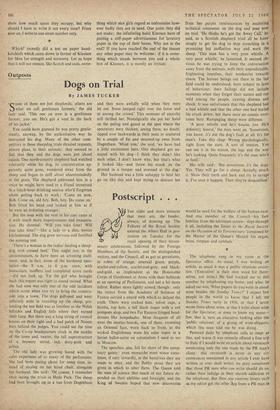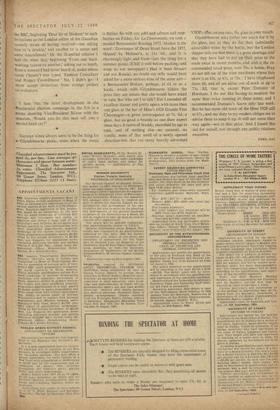Postscript
THE older and more eminent that men are, the fonder, always, of dressing up. The Fellows of the Royal Society entered the Albert Hall in pro- cession on Tuesday for the royal opening of their tercen- tenary celebrations, followed by the Foreign Members of the Society, and the distinguished visitors, and the Council, all as gay as geraniums, in robes of orange, emerald green, purple, scarlet-and-yellow, scarlet-and-grey, and black- and-gold, as resplendent ds the Honorable Corps of Gentlemen at Arms with their halberds at an opening of Parliament, and not a bit. more infirm. Rather more lightly armed, though: only the visitor from the Academy of Sciences of France carried a sword with which to defend the truth. There were cocked hats, velvet caps, a biretta, top hats, a tall black toque with a red pompom atop, and two Far Eastern fringed head- dresses like lampshades. Most frequent of all were the mortar-boards, one of them, crowning an Oriental face, worn back to front, as the wicked Englishman wore his solar topee in a Soviet ballet-satire on colonialism I used to see in Moscow.
The speeches, alas, fell far short of this sump- tuary gaiety: even monarchs must wince some- times, if only inwardly, at the banalities they are made to utter, and the flabby prose they are given in which to utter them. The Queen told the men of science that much of our future de- pended on their abilities and foresight, and the King of Sweden hoped that new discoveries 'would be used for the welfare of the human race And one member of the Council—his face familiar from the television screen—slept through it all, including the Salute to the Royal Society on the Occasion of its Tercentenary 'composed b the Master of the Queen's Musick for organ brass, timpani and cymbals.'
The telephone rang in my room at the Spectator office. As usual, I was writing a article, as usual it was a public relations execu- tive. (`Executive' is their own word for them- selves, not mine.) He had tracked me to this number by telephoning my home, and what he asked me was, 'What papers do you write in about wine besides the Sunday Times?' I expect few people in the world to know that I left the Sunday Times early in 1956, or that I never wrote there about wine, or that I write about wine for the Spectator, or even to know my name— few, that is, save an executive looking after the 'public relations' of .a group of wine-shippers, which this man told me he was doing.
Pestered daily by telephone calls as inept as this, and worse (I was recently offered a free trip `to Italy if I would write an article about vermouth mentioning only the one made by the PR man's client: this vermouth is never in any
cir- cumstances mentioned in any article I ever have written or ever shall write), we pray sometimes that those PR men who can write should do so, rather than indulge in their slavish' addiction to the telephone. But then one receives letters such as my editor got the other lay from a PR man in
y
the BBC, beginning 'Dear Sir or Madam,' or such invitations as the London editor of the Guardian recently wrote of having received—one asking him to 'a drinkie,' and another to 'a natter and some nourishment.' Or the ill-spelled missive 1 had the other day, beginning 'From. one hard- working tycoon to another,' asking me to lunch, from a woman I had never heard of, under whose name ('Sunny') was typed, 'Fashion Consultant and Project Co-ordinator.' No, I didn't go: I never accept invitations from strange project co-ordinators.
I hear that the latest development in the Presidential election campaign in the US is a Poster showing Vice-President Nixon with the question, 'Would you let this man sell you a second-hand car?' ,
* German wines always seem to be the thing for a Glyndebourne picnic. even when the music is Italian. So with our [Ate and salmon and rasp- berries on Friday, for La Cenerentola, we took a modest Berncasteler Riesling 1955. Modest is the word : Downman of Dean Street have the 1955, shipped by Hamer's, at I Is. 6d., and it is charmingly light and fresh—just the thing for a summer picnic. (Chill it well before packing, and wrap in wet newspaper.) Had it been Mozart and not Rossini, no doubt my wife would have asked for a more serious wine of the same sort— a Berncasteler Doktor, perhaps, at £4 or so a bottle, which with Glyndebourne tickets the price they are means that she would have asked in vain, But who ant Ito talk? For I rounded off excellent dinner and pretty opera with more than one glass at the bar of Hine's 1928 Grande Fine Champagne—a gross extravagance at 7s. 6d. a glass, but as good a brandy as one dare expect these days. It tastes of brandy, smoothed by age in cask, and of nothing else—no caramel, no vanilla, none of that smell of a newly opened chocolate-box that too many heavily advertised
VSOPs offer, as you raise the glass to your mouth.
Glyndebourne asks rather too much for it by the glass, just as they do for their (admittedly admirable) wines by the bottle, but the London shipper tells me that there is a great shortage, and that they have had to put up their price to the trade twice in recent months, and with it the re- commended retail price, now 75s. a bottle. Pray do not tell me of the wine merchants whose lists show it at 63s. or 67s. or 70s.: I have telephoned them all, and all are either out of stock or up 75s. All, that is, except Peter Dominic of Horsham. I do not like having to mention the same firm twice running in these notes, and I recommended Dominic's Soave only last week. But he has some old stock of the Hine 1928 still at 67s., and my duty to my readers obliges me to advise them to snap it up. It will not come their way again—not at that price. And I found this out for myself, not through any public relations executive.
CYRIL RAY























































 Previous page
Previous page